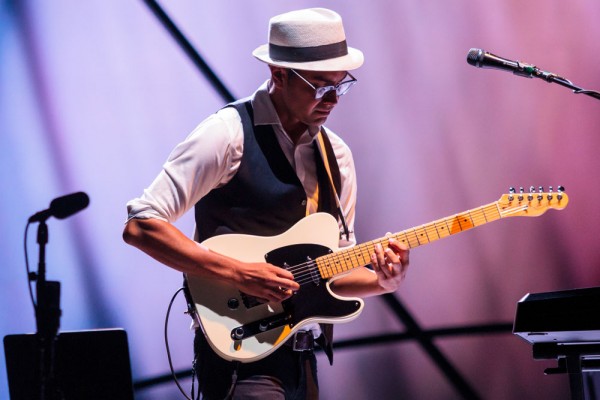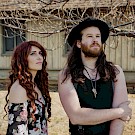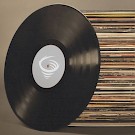 Dave Depper: Photo by Brian Stowell
Dave Depper: Photo by Brian StowellPortland is teeming with musical success stories. Musicians who began pretty much like all artists do—performing for a dozen people at a house show, flyering telephone poles for bar gigs, or catching breaks opening for touring bands at one of the more venerable local venues—have utilized the city for more than just a home base, turning it into their own personal launching pad. Quick-glimpse examples could be bands like Menomena, Norfolk & Western or Loch Lomond. The common thread with each of those seemingly disparate bands, coincidentally and outside of regional proximity, is one musician-about-town: Dave Depper.
For the past decade, Depper has relatively quietly assumed the role of go-to collaborator, sideman, studio musician and touring partner for an increasingly impressive litany of artists—both Portland-based and beyond. Having amassed a reputation as a deft multi-instrumentalist, as well as an easygoing, funny and charismatic presence in the local music community, Depper’s collaborative reach has culminated in national tours with the likes of Jolie Holland, Mirah and Ray Lamontagne—the latter of which provided Depper the grateful opportunity of performing on the Late Show with David Letterman this past summer.
As with lots of under-the-radar tales, Depper’s opening chapter into the big novel of his musical life came pretty much out of nowhere.
Depper moved to Portland from Bend following his graduation from the University of Oregon. Ditching a music major after two years—citing the fact that, for him, “academia and art didn’t mix”—Depper changed his focus to computer and information science, resigning himself to the life of a software engineer. After eight months in Portland, though, a random Craigslist encounter altered the course of his post-grad routine.
“By chance, I bought a Farfisa organ off of Craigslist, and the person selling it happened to be Chad Crouch, founder of Hush Records,” Depper explains. “He asked if I wanted to play bass for his band Blanket Music. I didn’t play bass, nor did I own one, but for some reason I said yes.”
 Photo by Jason Travis
Photo by Jason TravisNot long after, Depper and Crouch were recording an album together at Type Foundry Recording Studio, where Depper then met engineer and author Adam Selzer and ex-Decemberists drummer Rachel Blumberg, the primary songwriters for Norfolk & Western.
“They asked if I wanted to play bass for them,” Depper continues. “I said yes and they took me on my first tours. From there, I met basically everybody I know now. It was an incredible learning experience.”
Depper’s talents yielded further requests from Selzer for studio assistance as a musician on several projects. Before long, Depper was asked to be a touring member of Jolie Holland’s band.
“Things just kind of exploded after that,” Depper recounts.
Logging time on major national tours and sitting in for studio sessions have fueled the majority of Depper’s working scope since 2003. His creative bents, however, haven’t been relegated solely to playing second fiddle. His work composing soundtrack pieces for licensing purposes has emerged as a lucrative tributary to Depper’s parasol of pop talents. That said, a majority of Depper’s licensing work is for agencies who cull material from small pools of composers, meaning lots of his efforts don’t ever see the light of day. Outside of a few smaller spots, Depper’s most visible and heard licensing work emerged in 2014 with a song he penned for the Cover Oregon campaign, the health insurance marketplace for Oregon under the Affordable Care Act, which was accompanied by a 30-second commercial that even featured an illustrated, flying version of Depper himself.
In 2010, Depper also took on a personal project: The complete rerecording of Paul McCartney’s seminal post-Beatles LP Ram (listen below). The home-recorded project took Depper—along with vocalist Joan Hiller playing the Linda McCartney role—just one month, with Depper spending eight to 12 hours a day on the project. The album was ultimately released nationally by Portland’s Jackpot Records.
Currently, the chameleonic Depper is on and off the road while also working on what will be his first solo album of original material. While still very much in the works, the script is flipped a bit on Depper, with his musical vision laboring through the doubts and ebbs and flows he’s so often viewed from the outside looking in.
“I go through waves of thinking my record is the greatest thing ever or being totally embarrassed by it and wanting to scrap the whole thing,” Depper admits. “But at the end of the day, I’m really excited about it.”
Once again, Depper has recorded the entire album by himself at his home studio, playing all of the instruments and performing all of the vocals, save for a duet that he invited Portland folk singer Laura Gibson to sing with him.
“It’s a very synthy, very poppy record,” Depper says. “Think Hall & Oates meets Air while slightly stoned in a very modern, stylish apartment with an unmade bed.”
That dichotomy of the sideman stepping into his own spotlight is not lost on Depper. A careful collaborator—in whatever capacity that’s asked of him—Depper has soaked up strategies and philosophies regarding the level of partnership he assumes prior to his gigs with fellow musicians, either in-studio or on the road.
“Something that I am always, always, always trying to keep in mind as a sideman is to remember to play without ego,” Depper says. “The show is not about me. It is about the person I am backing. While it’s nice to get the spotlight for a guitar solo, or a shoutout from the front person, those are bonuses and they aren’t to be expected. My job is to make the show as good as it can be. My job is not self-promotion.”
Depper is also aware that, not unlike myriad creative vocations that seem too good to be true, working as a side musician, or studio player, is hard work. He follows a slew of basic tenets to remind himself of how to perpetuate his good fortune.
“No matter how good you are at whatever it is you do, there’s always going to be someone better,” Depper explains. “Want to get the gig? Be somebody that people want to hang out with. Don’t be the person about whom people say: ‘Well, he’s an awesome player, but...’”







